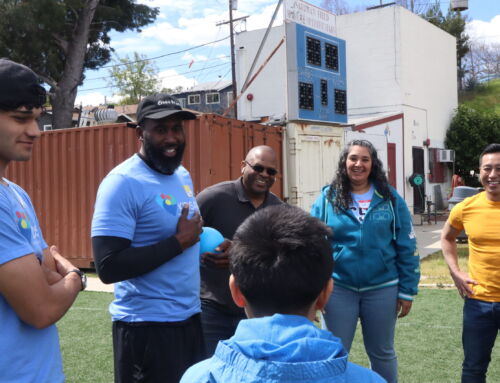54,000 kids were adopted from foster care in 2021. Only 9,000 were Black youth.

Growing up in America, Black youth face obstacles such as racism, police brutality and poverty. For Black children in foster care—especially Black children placed in homes with families of a different race—these obstacles can be even greater as their families are not adequately trained, educated, or supported to handle the unique challenges these children face.
Although Black youth only make up 14% of the total child population, they make up 22% of youth in the U.S. foster care system. Additionally, in 2021 there were over 23,800 Black youth waiting to be adopted from foster care, yet only just over 9,000 were adopted. If a child growing up in foster care cannot be reunified with biological family or adopted into a loving family, they will age out of the foster care system alone. On average, 23,000 youth age out of foster care each year without being reunified with biological family, finding legal guardianship, or being adopted. Not only does this leave them to face numerous challenges alone, it also increases their risk of homelessness, unemployment, involvement with the justice system, unplanned pregnancy, and substance abuse.
Expanding Meaningful Black Relationships And Creating Equity
In order to better understand and help cultivate solutions to these obstacles, Kidsave is launching the EMBRACE project – Expanding Meaningful Black Relationships And Creating Equity. A multi-year, research-driven partnership with Gallup’s Center on Black Voices, the project aims to better understand and improve the long-term health and success for Black youth in foster care.
“The EMBRACE Project is an opportunity to give Black foster youth more of a chance towards success, self-sufficiency, and long-term health and wellness. Black children already face many obstacles in America,” says Shantay Armstrong, Kidsave’s Strategic Communications Manager for Diversity, Equity, and Inclusion. “It is our duty to place Black children in foster care in loving stable homes while also figuring out how we can better support the families who support foster youth. When one of us wins, we all win.”
To help oversee the project and ensure its success, Kidsave has also begun assembling a group of leaders and advocates in the space to form the EMBRACE Project task force. The task force provides valuable insight via stakeholder interviews, monthly review meetings, subcommittee meetings, and focus groups.
Kidsave Co-Founder and CEO Randi Thompson says, “We are excited to launch the EMBRACE Project and to have an amazing task force of leaders within the Black community, child welfare practitioners, corporate and industry experts, and, most importantly, individuals with lived experience within the child welfare system overseeing our progress and providing their invaluable insight along the way. This initiative is much larger than Kidsave. The insight we gain from this national study will benefit agencies and organizations across the country, and together, we will be able to work to improve outcomes for Black youth in foster care.”
A Pathway Forward
The importance of the connection of loving mentors and adoptive families in the Black Community and beyond cannot be understated. Yet misconceptions and institutional barriers may limit or even prevent members of the Black community from positively engaging in the lives of kids in foster care. By better understanding the barriers, we can provide a pathway for more Black families and culturally competent and aware families to participate in long-term mentoring, adoption and fostering and ensure more Black children and teens find loving, permanent homes.
Task force co-chair Lauren Davis, whose background is in advocacy communications, also stresses that it is critical to recognize and acknowledge the current relationship and community dynamics between Black families and the system as we communicate and enlist support. “We have to tell the truth about the need and the current situation, sharing real stories and experiences. Through this and through our elevated voices nationwide, we know more Black children in foster care can have a chance to thrive in families.”
The EMBRACE Project will consist of a national study with two rounds of data collection using both quantitative and qualitative methods to learn more about motivators, perceptions, and barriers impacting the Black community’s approach to mentoring, fostering, and adopting Black youth. The first phase of the EMBRACE project research was fielded in March 2023, thanks to generous financial support by the Dave Thomas Foundation for Adoption. The second phase of data collection and the subsequent analysis and reporting are set to kick off this month, with final results expected by November.
Upon the completion of the national study, Kidsave and its partners will use the insights and data collected to inform better recruitment practices, influence policy and practice changes within the child welfare system, and work to establish better relationships and support for Black families and Black youth interacting with the foster care system.
Partner with us!
We are actively seeking additional funding to complete the second phase of data collection and the subsequent analysis and reporting. We are also actively seeking additional task force members and volunteers for the EMBRACE project.
Current Task Force Members:
Darrell Booker (Microsoft), Lauren Davis (American Cancer Society Cancer Action Network – ACS CAN), Keri Hope Richmond (American Academy of Pediatrics), Charity Chandler-Cole (CASA Los Angeles), Sunshine Best (Tulane University), DeJuana Jernigan (Arms Wide), Dr. Tamara Hunter (Commission for Children and Families), Honorable Erica Thomas (Former Georgia Representative), Alain Datcher (LA County Youth Commission), and Deborah Bryant (Centers for Medicare and Medicaid). Honorary Member Representative Sydney Kamlager-Dove.
Contact Shantay Armstrong at shantay@kidsave.org to learn more and get involved!


